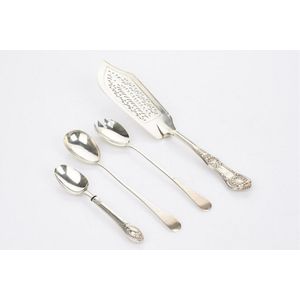Victorian Silver Cake Server and Salad Servers Set, 1845
Mark of George William Adams, London, 1845, Victorian sterling silver cake server, the scalloped blade reticulated with stylised leaves, the shaft decorated with scrolls and stamped with assay marks verso, together with a pair of sterling silver salad servers, mark of Hardy Brothers, and a similar spoon (4), weight 360 grams. Provenance: Private Collection Sydney
You must be a subscriber, and be logged in to view price and dealer details.
Subscribe Now to view actual auction price for this item
When you subscribe, you have the option of setting the currency in which to display prices to $Au, $US, $NZ or Stg.
This item has been sold, and the description, image and price are for reference purposes only.
- Assay / Assayed - Assaying is the testing of a metal, most commonly silver and gold to determine its ingredients and quality. In Britain, once an item of silver or gold has been assayed, a mark is stamped on it, certifying its purity. Known as hallmark, it derives its name from the Guild Hall of the Goldsmiths' Company, who recieved its Charter in 1327 giving it the power to assay and mark articles of gold and silver.
- Sterling Silver - Sterling silver is a mixture of 92.5% pure silver and 7.5% of another metal, usually copper. Fine silver is 99.9% pure silver, and is relatively soft and the addition of the very small amount of copper gives the metal enough strength and hardness to be worked into jewellery, decorative and household objects.
- Verso - Verso is the "back" side of a sheet of paper, art work, coin or medal. The front side is "recto".
- Victorian Period - The Victorian period of furniture and decorative arts design covers the reign of Queen Victoria from 1837 to 1901. There was not one dominant style of furniture in the Victorian period. Designers used and modified many historical styles such as Gothic, Tudor, Elizabethan, English Rococo, Neoclassical and others, although use of some styles, such as English Rococo and Gothic tended to dominate the furniture manufacture of the period.
The Victorian period was preceded by the Regency and William IV periods, and followed by the Edwardian period, named for Edward VII (1841 ? 1910) who was King of the United Kingdom and the British Dominions and Emperor of India for the brief period from 1901 until his death in 1910. - Scallop / Shell Motif - The shell motif has been used in furniture and decorative arts for centuries. In ancient Greece and Rome, shells were often used as decorative elements on furniture and in mosaics. The scallop or cockleshell are the most commonly used. During the Renaissance, the shell motif became popular in furniture and architecture, as the ornate decoration was seen as a symbol of wealth and luxury. In the 18th century, the Rococo style of furniture and decorative arts featured an abundance of shell motifs, and it was used by Thomas Chippendale and as a feature on Queen Anne style cabriole legs. In the 19th century, the shell motif was incorporated into Victorian furniture and decorative items, and often a representation of the the conch shell was inlaid into furniture.
- Marrow Spoon - A spoon with a long handle and a narrow scoop shaped bowl, used to scoop and eat marrow from the hollow centre of roasted bones. Some marrow scoops are double ended with a different shaped bowl at each end.
This item has been included into following indexes:
